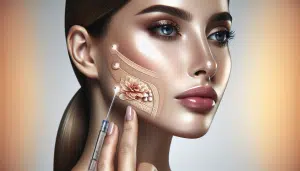Does Collagen Really Transform Skin Health
Charlotte Stone October 20, 2025
Curious about collagen and its impact on radiant skin? This guide explores the real science behind collagen supplements, natural production, and practical beauty tips to support a glowing complexion. Learn what actually works for skin health, including lifestyle and diet, as well as dermatologist-backed insights.
The Role of Collagen in Beautiful Skin
Collagen is often at the center of conversations about glowing, youthful skin. As a structural protein, collagen provides strength and elasticity, helping maintain a smooth, lifted look. With age, collagen production slows, which contributes to fine lines, wrinkles, and a loss of firmness. Understanding how this natural protein functions can clarify whether products or supplements claiming to restore it deliver real beauty benefits or just marketing promises.
There are several types of collagen, but type I is most abundant in the skin’s dermal layer. It works alongside elastin and hyaluronic acid to keep skin supple. Sun exposure, environmental pollutants, stress, and poor diet can all degrade collagen stores faster. As these external factors chip away at skin’s natural support, visible changes can emerge, making many seek ways to preserve or boost collagen for beauty and wellness.
Research indicates that while topical products may help temporarily hydrate skin, the body’s natural collagen synthesis depends heavily on internal factors. Nutrition, hydration, and overall skin care routines play vital roles. Understanding the science behind collagen is a first step to separating facts from hype and discovering practices that can genuinely support healthy, radiant skin. (Source: https://www.ncbi.nlm.nih.gov/pmc/articles/PMC7238024/)
Collagen Supplements: Myths, Evidence, and Real Results
Collagen supplements are everywhere—powders, capsules, even beauty drinks. Brands promise revitalized skin, but what does current research say? When consumed, collagen is broken down into amino acids in the digestive tract. Some studies suggest these fragments, known as peptides, might stimulate skin cells to produce new collagen, but results can vary. Evidence is strongest for enhanced skin elasticity and hydration, though the effect may be modest for most users. (Source: https://www.ncbi.nlm.nih.gov/pmc/articles/PMC6835901/)
Only certain hydrolyzed collagen supplements have shown the ability to influence skin properties in clinical trials. It’s important to note that not all products are created equal—source, processing, dosage, and duration all matter. People often report subtle improvements after several weeks, such as smoother texture or less noticeable fine lines. Supplements appear safest for most, but potential users should look for third-party testing and check with healthcare professionals if unsure.
Many dermatologists recommend supporting any supplement routine with a solid skincare plan rather than relying on pills alone. Combining collagen-boosting foods with sun protection, hydration, and gentle cleansing often delivers more noticeable, lasting benefits. For those considering ingestible collagen, understanding both the limitations and the possible advantages helps form realistic expectations, grounded in what reputable sources and experts advise. (Source: https://www.hsph.harvard.edu/nutritionsource/collagen/)
Natural Ways to Boost Collagen for a Healthy Glow
Four cornerstone lifestyle choices influence natural collagen production: diet, sleep, exercise, and skin care. Vitamin C, zinc, and amino acids—particularly proline and glycine—are all necessary for collagen synthesis. Foods rich in these nutrients include citrus fruits, berries, leafy greens, beans, eggs, and certain meats. Individuals with a nutrient-dense, varied diet often show stronger, more resilient skin, hinting at the power of balanced nutrition for beauty.
Protecting skin from excessive ultraviolet rays is a simple practice with outsized effects. Sun exposure speeds collagen breakdown, emphasizing the importance of daily broad-spectrum sunscreen. Good sleep patterns, meanwhile, support skin repair cycles, allowing for more efficient rebuilding of damaged proteins. Chosen together with regular, moderate exercise—known to improve circulation and oxygenation—these habits provide a solid foundation for skin longevity.
Avoiding cigarette smoke and managing stress also help preserve collagen. Smoking introduces toxins that break down skin proteins, while chronic stress can trigger hormones that diminish repair. For those searching for a beauty routine that lasts, focusing on gentle, hydrating cleansers, antioxidant-rich serums, and mindful habits is often more sustainable than searching for a magic bullet. Lifestyle truly matters in the pursuit of healthy, luminous skin. (Source: https://www.aad.org/public/everyday-care/skin-care-secrets/routine/building-skin-care-routine)
Collagen and Beauty Products: What Works and What to Question
Collagen-containing creams, masks, and serums are popular in the beauty aisles. However, the science behind topical collagen is mixed. Large collagen molecules cannot penetrate deeply into skin when applied topically. Instead, these products may hydrate and smooth the outer layer, giving a temporary plumping effect. For true collagen renewal, focus often shifts to retinoids, peptides, and antioxidants that encourage the body’s own renewal processes.
Retinoids, available by prescription and over-the-counter, are among the most researched for fostering collagen growth. They work by stimulating cellular turnover and encouraging new protein formation. Vitamin C serums also have scientific backing, as ascorbic acid functions as a cofactor in collagen synthesis and provides additional protection against environmental damage. Consumers interested in maximizing beauty routines can benefit from product ingredient research to ensure their choices are evidence-based and effective.
For individuals with sensitive skin, gentle moisturizers and sunblock remain the cornerstones of any routine. Consulting with a dermatologist can help address personal goals like improved firmness or reduced wrinkles. While some beauty trends come and go, favoring clinically proven ingredients and broad-spectrum protection can offer longer-term rewards without the need for constant product rotation. (Source: https://www.fda.gov/cosmetics/cosmetic-ingredients/collagen-and-cosmetics)
Professional Treatments for Collagen Stimulation
For those looking for more dramatic changes, professional treatments such as laser therapy, micro-needling, and radiofrequency procedures offer options. These approaches work by creating controlled micro-injuries in the skin, prompting the natural wound-healing response. This, in turn, triggers collagen and elastin production, leading to smoother texture and improved tone—typically in several sessions spaced weeks apart under clinical supervision. (Source: https://www.aad.org/public/cosmetic-procedures/lasers-treatments/facts)
Micro-needling involves fine needles penetrating the skin in a grid-like pattern. The process is typically well-tolerated and can improve scars, elasticity, and minor wrinkles. Some clinics combine this with the application of topical nutrients or platelet-rich plasma to potentially optimize outcomes. Results may last for several months, with minimal downtime compared to surgical facelifts or chemical peels, making these treatments accessible to a wider audience.
While professional treatments can deliver visible results, realistic expectations are important. Maintenance sessions and continued skin care are usually required to preserve enhancements. Consulting with a board-certified dermatologist or plastic surgeon ensures the approach is safe and tailored to individual skin types. Informed decisions and open conversations about achievable outcomes support both wellness and beauty goals without the risk of disappointment.
Building a Sustainable Skincare Routine for Lifelong Beauty
Creating a routine that supports collagen health requires consistency. Gentle cleansing, moisturizing, sun protection, and sleep form the backbone of sustainable care. These simple habits support skin’s repair abilities each day. Paired with evidence-backed ingredients and regular lifestyle choices, even basic routines can yield meaningful results for most adults aiming for graceful aging.
Listening to skin’s needs can make a difference. Adjust products according to changes in the environment, stress, or diet. Sometimes, less is more—overuse of harsh exfoliants or numerous actives can disrupt the skin barrier and reduce collagen-supporting benefits. Simplicity amplifies the value of a routine, especially when guided by dermatologist recommendations or reputable sources.
Supplement use, professional treatments, or trending products may add a boost, but relying on foundational habits keeps beauty goals attainable and long-term. Wellness and beauty go hand in hand—a holistic approach empowers individuals to feel confident in their routines while adapting over time. Informed self-care makes radiant skin a journey, not a destination. (Source: https://www.niams.nih.gov/health-topics/skin-care)
References
1. Yamaguchi, Y., & Yoshikawa, K. (2020). Collagen and Skin Health. Retrieved from https://www.ncbi.nlm.nih.gov/pmc/articles/PMC7238024/
2. Choi, F. D., Sung, C. T., & Juhasz, M. L. W. (2019). Collagen Supplements: A Review. Retrieved from https://www.ncbi.nlm.nih.gov/pmc/articles/PMC6835901/
3. Harvard T.H. Chan School of Public Health. Collagen: What is it and what are its uses? Retrieved from https://www.hsph.harvard.edu/nutritionsource/collagen/
4. American Academy of Dermatology Association. Building a skin care routine. Retrieved from https://www.aad.org/public/everyday-care/skin-care-secrets/routine/building-skin-care-routine
5. U.S. Food and Drug Administration. Collagen and Cosmetics. Retrieved from https://www.fda.gov/cosmetics/cosmetic-ingredients/collagen-and-cosmetics
6. National Institute of Arthritis and Musculoskeletal and Skin Diseases. Skin Care and Aging. Retrieved from https://www.niams.nih.gov/health-topics/skin-care







